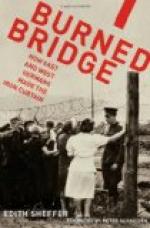And in August there burst upon an incredulous world the jagged lightnings and cannon-thunder of war.
It would be waste words to describe here the varying fortunes of the grappling armies during the next few months. The newspapers and current periodicals and countless self-appointed historians have attended to that. It is all recorded, so that one must run to read it all. It is as terribly vivid to us now as it was distant and shadowy then—a madness of slaughter and destruction that raged on the other side of the earth, a terror from which we stood comfortably aloof.
There was something in the war unseen by Thompson and the Hendersons and a countless host of intelligent, well-dressed, comfortable people who bought extras wet from the press to read of that merciless thrust through Belgium, the shock and recoil and counter-shock of armies, of death dealt wholesale with scientific precision, of 42-centimeter guns and poison gas and all the rest of that bloody nightmare—they did not see the dread shadow that hung over Europe lengthening and spreading until its murky pall should span the Atlantic.
Thompson was a Canadian. He knew by the papers that Canada was at war, a voluntary participant. But it did not strike him that he was at war. He felt no call to arms. In San Francisco there was no common ferment in the public mind, no marching troops, no military bands making a man’s feet tingle to follow as they passed by. Men discussed the war in much the same tone as they discussed the stock market. If there was any definite feeling in the matter it was that the European outbreak was strictly a European affair. When the German spearhead blunted its point against the Franco-British legions and the gray hosts recoiled upon the Marne, the Amateur Board of Strategy said it would be over in six months.
In any case, American tradition explicitly postulated that what occurred in Europe was not, could not, be vital to Americans. But in the last test blood proves thicker than water. Sentimentally, the men Thompson knew were pro-Ally. Only, in practice there was no apparent reason why they should do otherwise than as they had been doing. And in effect San Francisco only emulated her sister cities when she proceeded about “business as usual”—just as in those early days, before the war had bitten deep into their flesh and blood, British merchants flung that slogan in the face of the enemy.
So that to Wes Thompson, concentrated upon his personal affairs, the war never became more than something akin to a bad dream recalled at midday, an unreal sort of thing. Something that indubitably existed without making half the impression upon him that seeing a pedestrian mangled under a street car made upon him during that summer. The war aroused his interest, but left his emotions unstirred. There was nothing martial about him. He dreamed no dreams of glory on the battlefield. He had never thought of the British Empire as something to die for. The issue was not clear to him, just as it failed to clarify itself to a great many people in those days. The maiden aunts and all his early environment had shut off the bigger vision that was sending a steady stream of Canadian battalions overseas.




